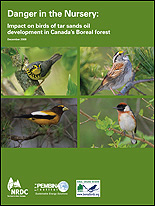
News |
- Canada Leads Race to Bottom - Poznan
- Oil Sands Threatening Birds
- Climate Fossil Awards for Canada
- Pre-Copenhagen Climate Declaration Signed
- Toronto Bans Bottled Water
- Canadians Want Climate Action Despite Economy
- Quebec Leads Environmental Protection
- 'The World is Watching' Poznan Climate Meetings
- Agreement Recognizes Métis Nation Rights
- Polar Bear Quota Threatens Population
- Ontario Economy Looking Green
- Energy Champions to Lead Conservation
| Canada Leads Race to Bottom - Poznan | 12 December 08 |
 Just as the world community was beginning to look again to North America for leadership, Canada is digging in its heels, obstructing progress at UN climate talks. Just as the world community was beginning to look again to North America for leadership, Canada is digging in its heels, obstructing progress at UN climate talks."It's such a shame," said the David Suzuki Foundation's Dale Marshall. "Canadians are saying they want to see action on climate change, and the world's foremost decision-makers are saying it's possible to fix the environment and the economy at the same time. We have Obama saying yes we can, and Canada says, no we won't." The U.S. position is shifting with the election of Barack Obama, who though absent from these talks, has indicated a willingness to bring the U.S. back into the international fold. "We have been very encouraged by the Chinese government's movement, but when a country like Canada refuses to participate, it's very difficult to maintain momentum," said Hou Yanli, Director, Global Climate Initiative, WWF China. "One of the richest countries in the world is blocking progress. Industrialized countries like Canada must show leadership," said Moussa Na Abau Mamouda of ENDA Third World, Dakar, Senegal. "It's so disappointing. Canadians expect better," said Joy Kennedy of the United Church of Canada. "We used to be proud of Canada's leadership on the world stage. We used to exercise moral authority in times of crisis. Now it's painful to watch Canada behaving as if climate change is not a crisis-even in our own country, particularly the far North." December 13, 2008 Edmonton Sun articleDecember 4, 2008 report: Deep Reductions, Strong Growth (PDF) December 10, 2008 Climate Action Network Canada press release & backgrounder December 10, 2008 The Pembina Institute press release December 10, 2008 Canada.com article December 10, 2008 The Montreal Gazette December 10, 2008 Canadian Press Sources: Pembina Institute, Climate Action Network Canada |
|
 Print version Print version |
Top |
| Oil Sands Threatening Birds | 11 December 08 |
 As many as 166 million birds could be lost over the next 30-50 years as a result of Alberta's oil industry. Extraction and refining of oil from Canada's tar sands is resulting in significant habitat loss for North American migratory birds. As many as 166 million birds could be lost over the next 30-50 years as a result of Alberta's oil industry. Extraction and refining of oil from Canada's tar sands is resulting in significant habitat loss for North American migratory birds. Danger in the Nursery: Impact on Birds of Tar Sands Oil Development in Canada's Boreal Forest is a new study released by Pembina Institute, Natural Resources Defense Council and the Boreal Songbird Initiative. The authors call on the Alberta government to stop approving projects until conservation and mitigation measures can be put in place. "At a time when bird populations are rapidly declining, this report puts into perspective the far reaching effects of tar sands oil development," said the report's lead author Jeff Wells, Ph.D. of the Boreal Songbird Initiative. "The public needs to understand the real and long-term ecological costs of this development." It is estimated half of America's migratory birds nest in the Boreal forest, and each year 22-17 million birds breed in the area slotted for potential development of tar sands oil. The report suggests impacts will increase despite international treaties to protect birds. View Danger in the Nursery: Impact on Birds of Tar Sands Oil Development in Canada's Boreal Forest (PDF)View December 2, 2008 NRDC press release View December 2, 2008 CBC article View December 2, 2008 Associated Free Press article View December 2, 2008 Reuters article Sources: NRDC, CBC, Associated Free Press, Reuters |
|
 Print version Print version |
Top |
| Climate Fossil Awards for Canada | 08 December 08 |
 During international climate talks in Poznan, Poland, Canada was given an unprecedented four "Fossil of the Day" awards by the international community Thursday, December 4, 2008. During international climate talks in Poznan, Poland, Canada was given an unprecedented four "Fossil of the Day" awards by the international community Thursday, December 4, 2008.The awards are given to governments taking positions that stall or block the progress of climate negotiations. At the climate talks, the Canadian delegation has failed to take a constructive approach to negotiations. Canada tied for first place with Japan and Russia in failing to support deep reductions in emissions of greenhouse gases. Reductions of at least 25-40% are needed by 2020, in order to avoid dangerous global warming. For the second Fossil of the Day Award, Canada received two shame awards. Canada's negotiators argued the country should get a break on its emissions targets, because the tar sands release a lot of carbon. Canada also insisted rich countries should get special treatment for "welfare loss" - the "hardship" of using smaller cars, or public transit. "The tar sands should not be exempted from targets for reductions," said Stephen Hazell, Sierra Club Executive Director. Canada picked up a third award for arguing that special "national circumstances" (i.e., Canada is cold and big) are the reason for Canada being 29% above its Kyoto target. Other cold countries such as Sweden have been able to meet their Kyoto targets. View December 4, 2008 Sierra Club Canada press releaseView Fossil of the Day Awards Source: Sierra Club Canada |
|
 Print version Print version |
Top |
| Pre-Copenhagen Climate Declaration Signed | 04 December 08 |
 Regional leaders from the US, Canada, Mexico, Brazil, Indonesia and India recently signed a declaration that calls on states and provinces to strengthen their cooperative efforts for strategies to reduce greenhouse gas emissions. Regional leaders from the US, Canada, Mexico, Brazil, Indonesia and India recently signed a declaration that calls on states and provinces to strengthen their cooperative efforts for strategies to reduce greenhouse gas emissions.The declaration, issued by California Governor Arnold Schwarzenegger calls for action before the next global agreement on climate change is reached. The declaration commits signers to the exchanged of incentive programs, best practices, adaptation strategies and technology transfer. The nonbinding declaration establishes a framework for negotiators at the current United Nation talks toward a new climate treaty being held in Poznan, Poland. The next international climate agreement will be negotiated and signed in Copenhagen December 2009. The declaration sets in motion various workgroups to develop sector specific policy positions on industries producing the most greenhouse gases - forestry, agriculture, cement, transportation, energy, iron and aluminum. View November 19, 2008 California Office of the Governor press release & declarationView November 20, 2008 Los Angeles Times article View November 19, 2008 Reuters article View November 19, 2008 China View article View November 19, 2008 Associated Press article Sources: Office of the Governor - State of California, Los Angeles Times, Reuters, China View, Associated Press |
|
 Print version Print version |
Top |
| Toronto Bans Bottled Water | 04 December 08 |
 Toronto has banned sale of plastic water bottles at City Hall and civic centers by 2011. The move is part of a plan to divert 70 percent of Toronto's waste from going to the dump. About 35 million polyethylene water bottles end up in Toronto landfill sites each year, and an additional 65 million are recycled. Toronto has banned sale of plastic water bottles at City Hall and civic centers by 2011. The move is part of a plan to divert 70 percent of Toronto's waste from going to the dump. About 35 million polyethylene water bottles end up in Toronto landfill sites each year, and an additional 65 million are recycled.Toronto City Council agreed to implement a series of controversial packaging-reduction bylaws including a five-cent charge for every plastic bag used in retail or grocery stores starting in June 2009. Just last month the province of Ontario rejected a bill that would ban plastic water bottles. Education Minister Kathleen Wynne voted against the private member's bill, saying the plan wouldn't allow enough time to ensure clean water is available to everyone who needs it. According to the Polaris Institute 17 municipalities from 5 provinces have banned bottled water, while another 45 municipalities are planning restrictions. Environmentalists say tap water is just as good in most Canadian municipalities - and much cheaper. View December 3, 2008 Council of Canadians press releaseView December 3, 2008 Canada.com article View December 3, 2008 CBC article View November 7, 2008 Canadian Press article Visit Polaris Institute - Inside the Bottle Campaign View November 10, 2008 City of Toronto press release (PDF) View September 30, 2008 City of Toronto backgrounder (PDF) Sources: Canada.com, CBC, The Canadian Press, CTV, Environmental Working Group, Inside the Bottle, City of Toronto |
|
 Print version Print version |
Top |
| Canadians Want Climate Action Despite Economy | 02 December 08 |
 Even in the face of the current economic crisis, close to two-thirds of Canadians want Canada take action to address the climate crisis, according to polling results released December 2, 2008. Even in the face of the current economic crisis, close to two-thirds of Canadians want Canada take action to address the climate crisis, according to polling results released December 2, 2008. Some of the important messages from the poll:
"Canadians believe that the government should tackle global warming despite the economic crisis," said Graham Saul, Climate Action Network Canada. "Unfortunately, Canada's government is still stuck in a mentality that sees action on global warming as a risk to our economy." "If the government was listening to Canadians, we'd have a much more ambitious approach to cutting our greenhouse gas pollution," said Clare Demerse, a senior policy analyst at the Pembina Institute. "Right now, Canada's targets are nowhere close to the level that scientists tell us is needed to do our fair share in avoiding catastrophic global warming." Gaile Whelan Enns of Manitoba Wildlands commented, "We need to acknowledge that Opposition members of parliament are ready to take real action on global warming for Canadians. All parties need to make Parliament work for real climate actions." The poll was commissioned by four Canadian observer organizations attending the UN climate meetings in Poznan, Poland - the United Church of Canada, Greenpeace, Climate Action Network Canada, and the Pembina Institute. View December 2, 2008 Pembina Institute press releaseView results of the November 2008 McAllister Opinion Research Poll on Canadians Opinions on Global Warming (PDF) Source: Pembina Institute |
|
 Print version Print version |
Top |
| Quebec Leads Environmental Protection | 02 December 08 |
 Quebec has announced five new provincial parks and protection for 50 percent of lands above the 49th parallel from mining, hydroelectric and forestry development. Quebec has followed Ontario's lead, which announced similar protections of its north in July. Quebec has announced five new provincial parks and protection for 50 percent of lands above the 49th parallel from mining, hydroelectric and forestry development. Quebec has followed Ontario's lead, which announced similar protections of its north in July.Premier Jean Charest's commitment demonstrates a balance between conservation and economic development. The announcement ensures the protection of continuous tracks of land large enough to support such species as the caribou. Other provinces may be following suit. A new voluntary team of scientists called the International Boreal Conservation Science Panel is working to protect Canada's boreal forest. The panel hopes Manitoba, Saskatchewan and Alberta will follow Quebec and Ontario's example. The boreal forest stretches from Newfoundland to Alaska and is essential in the fight against climate change. Acting as a carbon sink, the area now holds 186 billion tonnes of carbon, equivalent to 27 years worth of global carbon emissions. It also holds massive reserves of freshwater and healthy populations of wildlife in fully functioning ecosystems. View November 16, 2008 Canada.com articleView November 21, 2008 First Perspective article View November 21, 2008 Canadian Press article View November 25, 2008 World Changing article View November 19, 2008 Reuters article Source: Canada.com, First Perspective National Aboriginal News, The Canadian Press, Canadian Boreal Initiative, World Changing |
|
 Print version Print version |
Top |
| 'The World is Watching' Poznan Climate Meetings | 28 November 08 |
 From December 1-12, 2008, official delegations from around the world will gather in Poznan, Poland for the annual United Nations climate change meetings. From December 1-12, 2008, official delegations from around the world will gather in Poznan, Poland for the annual United Nations climate change meetings.Environmental groups want to make sure Poznan isn't 'just another meeting'. They are urging citizens of the globe to send a message to climate change decision makers that 'The World is Watching' what happens at Poznan. These climate negotiations follow last year's launch of a negotiations 'roadmap' agreed to in Bali, Indonesia that paved the way to finalize an agreement beyond the conclusion of the Kyoto Protocol in 2012. But global leaders only have until next year's 2009 UN climate meetings in Copenhagen, Denmark to reach a deal. This year requires all nations to acknowledge responsibilities, negotiate in good faith, and commit to doing more to avoid dangerous shifts in the climate system. To get involved, submit photos through either the Greenpeace International website, WWF International website or a dedicated Flickr page. Envirnomental organizations will bring your photos to Poznan meetings, and present them to the world's leaders. Global citizens want Poznan to result in a commitment to a fair and ambitious climate deal at next year's UN climate talks in Copenhagen. Visit COP14 Poznan, Poland websiteVisit Flickr web page for 'The World is Watching' Visit Greenpeace International web page for 'The World is Watching' Visit WWF International web page for 'The World is Watching' View Manitoba Wildlands page content following the 2008 Poznan Climate Meetings Sources: WWF, Pembina Institute |
|
 Print version Print version |
Top |
| Agreement Recognizes Métis Nation Rights | 27 November 08 |
 The Métis Nation of Ontario has strengthened their relationship with the government of Ontario. A historic agreement was signed with the province formally recognizing the MNO as the representative body for the Métis people and for their contributions to Ontario. The Métis Nation of Ontario has strengthened their relationship with the government of Ontario. A historic agreement was signed with the province formally recognizing the MNO as the representative body for the Métis people and for their contributions to Ontario.At the MNO's annual general assembly this month, Aboriginal Affairs Minister Brad Duguid and MNO President Gary Lipinski signed the framework agreement. The Métis are a distinct Aboriginal people with a unique culture, language and heritage who have played an instrumental role in the shaping of Canada. On regional levels, Ontario Métis leaders have met to sign local consultation protocols to ensure the protection of Métis harvesting rights. Four such agreements have been signed to ensure that regional Métis councils will be consulted about land planning, energy, mining and forestry development on traditional territories. To date no similar agreements between the Manitoba government and Manitoba Métis Federation exist. View November 17, 2008 Government of Ontario - Métis Nation of Ontario Framework Agreement (PDF)View November 17, 2008 Newswire article View November 4, 2008 Thunder Bay Chronicle Journal article View September 10, 2008 The Métis Nation of Ontario article View June 18, 2008 The Métis Nation of Ontario Backgrounder on Métis Rights View November 19, 2008 Newswire article View November 17, 2008 The Métis Nation of Ontario article Sources: Thunder Bay Chronicle Journal, The Métis Nation of Ontario, NewsWire |
|
 Print version Print version |
Top |
| Polar Bear Quota Threatens Population | 26 November 08 |
 The World Wildlife Fund is applauding Environment Minister Jim Prentice's decision to meet various stakeholders in a round-table discussion to address over-hunting of polar bears in the Arctic Baffin Bay region. The World Wildlife Fund is applauding Environment Minister Jim Prentice's decision to meet various stakeholders in a round-table discussion to address over-hunting of polar bears in the Arctic Baffin Bay region.WWF condemned Nunavut and the Canadian government earlier for maintaining a poplar bear hunt quota of 105 bears. Estimates show the Baffin Bay sub-population, one of the most fragile, has dropped from 2,100 in 1997 to about 1,500. Greenland's quota for its own hunters is 68. Together with Nunavut's 105 bears, this is nearly three times the sustainable harvest. Scientists and environmental officials urge Nunavut to reduce its quota to 64 bears or less. Tribal elders insist the number of polar bears is actually rising but experts say bears are being pushed ashore as a result of melting sea ice and hunger. Government has deferred their decision but the low reproductive rate of polar bears could mean a lengthy recovery from over harvesting. The meeting is the first of three key steps called for by WWF-Canada in a letter sent to the Environment Minister. WWF also demanded an immediate stop of polar bear harvesting and development of a Conservation Action Plan. View November 17, 2008 WWF-Canada press releaseView November 6, 2008 CBC article View November 20, 2008 Economist article View November 6, 2008 Globe and Mail article View November 6, 2008 United Press International article Source: WWF-Canada, CBC, Economist, Globe and Mail, United Press International |
|
 Print version Print version |
Top |
| Ontario Economy Looking Green | 26 November 08 |
 Ontario's leading environmental organizations say revitalizing Ontario's economy lies in green initiatives. Thousands of jobs could result from renewable energy development, local food products and protecting valuable forests and fresh water sources. Ontario's leading environmental organizations say revitalizing Ontario's economy lies in green initiatives. Thousands of jobs could result from renewable energy development, local food products and protecting valuable forests and fresh water sources.Green Prosperity, a joint effort by 24 environmental groups, unveiled a set of seven environmental priorities for Ontario:
Green jobs are already springing up as a result of the growing wind energy sector in Ontario. A 44-turbine wind farm opened this past month that will create up to 70 jobs and generate clean electricity for 30,000 households. The environmental groups will develop a set of environmental actions and policy priorities to aid Ontario in becoming a world leader in green practices and programs. View November 14, 2008 Newswire articleVisit Green Prosperity - Putting Environmental Action to Work for Ontario View November 13, 2008 CNW Telbec article View November 24, 2008 Market Watch article Sources: Newswire, Green Prosperity, CNW Telbec, Market Watch |
|
 Print version Print version |
Top |
| Energy Champions to Lead Conservation | 21 November 08 |
 Ontario's Chief Energy Conservation Officer released his annual report early in November with recommendations to appoint more energy conservation "champions". His intent is to encourage broader energy conservation leadership across the province. Ontario's Chief Energy Conservation Officer released his annual report early in November with recommendations to appoint more energy conservation "champions". His intent is to encourage broader energy conservation leadership across the province.Peter Love, Ontario CECO, released "Be the change to a culture of conservation" that recommends businesses, health care and academic institutions throughout Ontario appoint an Energy Conservation Officer to champion energy conservation efforts. Ontario faces some of the toughest energy savings targets in North America. In an effort to reduce Ontario's peak consumption by 6,350 megawatts by 2025, Love is working to engage Ontarians in conserving energy. The report echo's his 2007 recommendation to have Municipal Energy Conservation Officers (MECO's) in every Ontario community. MECO's are already at work in cities like Toronto and Hamilton, Love recommends 12 additional cities need energy champions. View 2008 Chief Energy Conservation Officer's Annual Report (PDF)View "Be the Change to a Culture of Conservation" Notes for Remarks by Peter Love, Ontario Power Authority to the Ontario Energy Network (PDF) View November 5, 2008 Toronto Star article View November 5, 2008 CECO Annual Report: Health Care, Academic Institutions and Leading Businesses Should Appoint Conservation Champions View November 5, 2008 London Health Sciences Centre Energy Conservation Officer Reference in CECO Annual report Source: Ontario Power Authority Conservation Bureau, Toronto Star, CNW Group, Environmental Communications Options |
|
 Print version Print version |
Top |


 RSS Feeds:
RSS Feeds: